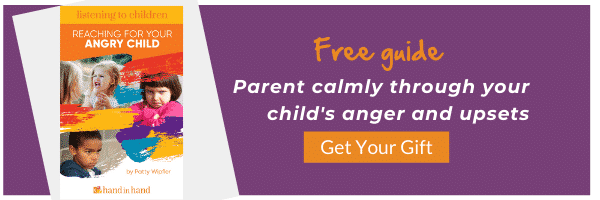 We’ve all been through it. That moment where you catch yourself saying things that you regret later. We all say things that don’t exactly sound like the loving, peaceful parent that we intend to be. It can feel like we are channelling an adult from our distant past, and we wonder why we have lost control.
We’ve all been through it. That moment where you catch yourself saying things that you regret later. We all say things that don’t exactly sound like the loving, peaceful parent that we intend to be. It can feel like we are channelling an adult from our distant past, and we wonder why we have lost control.
First of all – shouting is not your fault.
It’s not a sign that you are a terrible parent.
The fact that you’ve made it to this paragraph is a sign that you are a wonderful parent. You've taken time out of your busy life to read and think about how to do the very best for your children.
Shouting may be a sign that you are working ‘too hard,’ and that you need to take a step back to love and nurture yourself, to refill your cup so that you are feeling less stressed and triggered.
The brain science behind why we lose it is discussed in detail in Parenting From The Inside Out By Dan Siegal.
He explains why when we feel stressed, and overwhelmed, our pre-frontal cortex – the rational, reasoning part of our brain that is responsible for impulse control can’t function as well as it does in calmer times.
When this happens, unconscious memories from our own childhood get triggered, and we may start acting in ways that are similar to the ways we were treated when we were young.
Although it’s not our fault that we shout, we can do something about it by getting the nurturing and support we need to keep our brain into good thinking mode. And every time we resist shouting neurologists say we are actually rewiring our brain to make anger less likely in the future too.
So, here’s a list of 15 top tips for staying cool in the moment.
You can print it out and pin it to your fridge to remind yourself in times of need. Thanks to all the Hand in Hand parenting instructors who helped me with their tried and tested ideas!
#1. Get listening time – This is the best preventative tool there is. Getting some listening time when your children are in bed means that you can vent about the day’s struggles, and start the next day afresh. When we have a chance to talk to a listener about our own childhood it means we can let our past go, so it has less and less impact on our present. Getting regular listening time helps our thinking stay intact, so can stop ourselves from saying our angry thoughts. Even five minutes can make a difference, and once you’ve learnt the skills, listening partnerships are completely free!
#2. Have some downtime – We often get angry when our lives are over-scheduled and we have too much to do. We may find that the more we try to do, the more stressed, and the angry we get. So drop anything non-essential off your to-do list, cuddle up with your child, and focus on ‘being’ instead of ‘doing.’
#3. Meet A Friend – Having another adult around helps us to stay in ‘thinking’ mode. Being at home with children can feel isolating, and humans are social creatures. Our brains function best when we are with others. If you regularly find yourself getting stressed and angry try to see if you can factor in more adult connection into your days.
#4. Start the music and dance – Isabela Budusan recommends completely changing the atmosphere by putting on some music and having a dance. You could also try a game of chase. We can shake out our tension and reconnect with our children at the same time.
#5. Lie down on the floor – Patty Wipfler recommends this in her article here along with with a few other great suggestions. Lying down allows us to reset the situation, let the angry feelings float away and start afresh.
#6. Silly Noises – Julianne Idleman says, ”Make a crazy noise instead of yelling. You get some of your frustration out and the kids are more amused than scared.” You could also try ‘saying’ your angry words in a nonsense language that sounds funny.
#7. When your child’s behaviour drives you crazy From Julianne Idleman. Dramatically–very dramatically–pretend that whatever they are doing is definitely going to kill you. Moan, cry out, clutch at them as you fall to the floor. I used to do this when I could not hear the word “Stupid” one more time.
#8. Angry Stuffed Toy – From Julianne Idleman. Pretend a stuffed animal is going crazy over whatever you want to yell about and you have to be the one to hold him back before he “gets” the child.
#9. Deep Breaths – Julie Johnson recommends taking three slow deep breaths, or slowly drinking a glass of water. She also has a few more wonderful tips in her article here. This can be tough to remember in the moment, which is why it might be good to have some calm reminders around, like a favourite glass or this article.
#10. Emergency Listening Time – Make an arrangement with a listening partner that you will call each other when you are about to lose it. Sometimes just hearing your partner’s calming voice can be enough to shift your mood.
#11. Imaginary Listening Partner – Roma Norris says, When I’ve reached my limit and my kid is still off track, I have said: “Wait there, Mummy just needs to calm down, I’ll be back.”
I then go a short distance away and just imagine I am calling my listening partner and ranting at her. That was enough to take the urgency out of it and remember that the situation wasn’t as grave as I was projecting. (Roma also has a really helpful video, What to do when you’re about to lose it with your kid.)
#12. Owning And Accepting our Emotions – Michelle Welch has some really useful advice about owning and accepting our emotions. We can watch our emotions, riding them like a wave, knowing that we didn’t choose to have them and that they will pass in time.
#13. Journalling – Stephanie Parker says, I sometimes get my notebook and write down how mad I am, what I’d like to do to my daughter, what I’d like to say. It often makes me cry, and in just a few minutes it’s like I’ve given myself a listening time. I also sometimes tell the mirror how angry I am.
#14. Video for self-compassion – From Stephanie Parker. I grab my iPhone and take a very short video of myself asking the question – what would my inner loving mother say to me now? It makes me cry, but if I haven’t cried enough I’ll watch it back. This exercise, which originates from Marion Rose's Inner Loving Presence Process course, is such a great tool for self-compassion!
#15. Playful Anger -From Hanna Gauri Ma of Loving Earth Mama. I have a Larry Cohen inspired one. When I am getting worked up, I often exaggerate it and go playful. I’ll say something like ‘my head is going to explode’ and mime it out (all silly like) or ‘I wish I were a dragon, then I could breathe fire, right now’. It is like lightly laughing at how wound up this (probably) relatively minor thing is making me. It still transmits that this is serious and big for me while also keeping us connected through laughter.
You can find out more about listening partnerships here.
Hand in Hand parenting is here to help! If you need some more support or ideas then leave a comment or connect with the Hand in Hand parenting support group on facebook.

